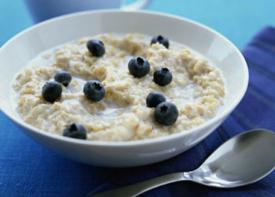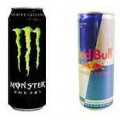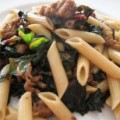Secrets About Pre-Race and Training Meals
- Updated: August 24, 2013

by Jerry Teixeira of Cardio Surge
 If you would like to learn the secrets of pre-workout and/or race meals and how to maximize their effectiveness, then you have to read this. I’ll cover how pre-workout meals help your performance, the time window you have to consume a pre-race meal, so it helps you instead of hurting you and what food to consider when creating your own pre-race or training meal.
If you would like to learn the secrets of pre-workout and/or race meals and how to maximize their effectiveness, then you have to read this. I’ll cover how pre-workout meals help your performance, the time window you have to consume a pre-race meal, so it helps you instead of hurting you and what food to consider when creating your own pre-race or training meal.
The key to performing intense workouts is to have energy or glycogen available to fuel our working muscles. Without properly loading our glycogen stores, we’re not taking full advantage of our stored energy potential. You can say it’s like running the tank on empty or half full before the race even starts. We simply won’t have the energy to fuel our workouts.
Our liver is able to store between 300 and 400 calories of glycogen and our blood stream is able to circulate not more than another 100 calories of glycogen at a time. This gives our bodies the ability to store between 400 to 500 calories of glycogen at a time. If we take the time to properly, fill our glycogen stores we will have a steady flow of energy to perform at a higher peak for a much longer period of time.
Although pre-race meals can load our glycogen stores and help to sustain perform at a high level for a much longer period of time, if we do not consume our meal at the right time, we can actually do more harm than good. This is why the timing of the meal is just as important as what we actually eat.
 The pre-race or workout meals should be consumed two to three hours prior to starting your workout or any prolonged and/or intense physical activity. This gives your body enough time to fully digest your meal and load your muscles, liver and blood stream with glycogen. There is a change that takes place in your body when food is ingested. This change redirects blood flow from the muscles to digestion.
The pre-race or workout meals should be consumed two to three hours prior to starting your workout or any prolonged and/or intense physical activity. This gives your body enough time to fully digest your meal and load your muscles, liver and blood stream with glycogen. There is a change that takes place in your body when food is ingested. This change redirects blood flow from the muscles to digestion.
Since the body’s total volume of blood remains the same, movement of excess blood to any part of the body requires an enlargement of vessels in that specific region that blood is needed, and a reduction in the size of the vessels in all other parts of the body. When you eat, there is a greater need for blood in and around the area of digestion for the purpose of breaking down food and carrying nutrients throughout body. When vessels dilate around digestion, they constrict in muscular areas.
If you perform prolonged and/or intense exercise during digestion, the central nervous system will constrict vessels around digestion and dilate in the working muscles. This redirection of blood flow slows the processes of digesting food. As a result, you may experience cramping, nausea, dizziness, and general feeling of fatigue.
 With your pre-race or training meal, you want to have an easily digested but high complex carbohydrate meal with a minimum of fiber, simple sugars, and saturated fat. High fiber foods won’t service any real value right before a race and could cause the need for a bathroom break if your event lasts a while, which during a race may not work well. Fat slows down digestion and has no positive influence on fuels metabolized during races or workout. Too many simple sugars can spike your insulin levels, causing a rapid removal of blood sugar and actually leaving you feeling more tired and with your glycogen stores still not full. As mentioned above you want to consume a high complex carbohydrate meal three hour before your race or workout. This will allow a slower release of glucose into the bloodstream to fill your muscles and liver without the over release of insulin, which causes glucose to be carried and stored as adipose tissue (fat).
With your pre-race or training meal, you want to have an easily digested but high complex carbohydrate meal with a minimum of fiber, simple sugars, and saturated fat. High fiber foods won’t service any real value right before a race and could cause the need for a bathroom break if your event lasts a while, which during a race may not work well. Fat slows down digestion and has no positive influence on fuels metabolized during races or workout. Too many simple sugars can spike your insulin levels, causing a rapid removal of blood sugar and actually leaving you feeling more tired and with your glycogen stores still not full. As mentioned above you want to consume a high complex carbohydrate meal three hour before your race or workout. This will allow a slower release of glucose into the bloodstream to fill your muscles and liver without the over release of insulin, which causes glucose to be carried and stored as adipose tissue (fat).
Although insulin is important to carry glucose into your muscles and liver, you do not want too much insulin to be released. When blood sugar levels are too high, an over release of insulin accrues to remove glucose from the bloodstream. Since the muscles and liver absorb glucose at a slow rate, the excess glucose ends up being stored as adipose tissue (fat). To avoid this, make sure your carbohydrates come from complex carbohydrate sources.
(Just to make sure there is no confusion, during prolonged activity or immediately after, your body can consume foods or drinks that are quicker digesting without the worry of an insulin spike.)
 For races or workouts lasting over 60 minutes to 90 minutes or more, it is also a good idea to consume a light amount of protein with your pre-workout or competition meal. Protein is the body’s building blocks, which helps with muscle repair and helps prevent cannibalization of muscles. Protein can be converted for energy use, but is done at a slower rate than carbohydrates, which can provide an energy source later in the race or workout.
For races or workouts lasting over 60 minutes to 90 minutes or more, it is also a good idea to consume a light amount of protein with your pre-workout or competition meal. Protein is the body’s building blocks, which helps with muscle repair and helps prevent cannibalization of muscles. Protein can be converted for energy use, but is done at a slower rate than carbohydrates, which can provide an energy source later in the race or workout.
Although a pre-workout meal or competition meal can be made up of many different foods, below are some suggestions you may find useful. Be sure to choose high starch food such as skinless potatoes, sweet potatoes, yams, beans, rice, pasta, plain bagels, or old fashion oatmeal. For protein, I suggest egg whites or a light protein shake.
One of my favorite pre-race or workout meals is one serving of old fashion oat meal, with a cup of blue barriers or a banana with a dash of cinnamon on top. If I feel the need for extra calories, I may add one tablespoon of all natural almond butter. I will have this meal three hours before my physical activity and one serving of Cardio Surge just one hour prior to my physical activity to make sure I’m set.



